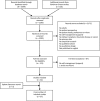Self-management support from the perspective of patients with a chronic condition: a thematic synthesis of qualitative studies
- PMID: 25619975
- PMCID: PMC5055271
- DOI: 10.1111/hex.12346
Self-management support from the perspective of patients with a chronic condition: a thematic synthesis of qualitative studies
Abstract
Background: Receiving adequate support seems to be crucial to the success of self-management. Although different empirical studies separately examined patients' preferences for self-management support (SMS), an overview is lacking.
Objective: The aim of this qualitative review was to identify patients' needs with respect to SMS and to explore by whom this support is preferably provided.
Search strategy: Qualitative studies were identified from Embase, MEDLINE OvidSP, Web of science, PubMed publisher, Cochrane central, the Cumulative Index to Nursing and Allied Health Literature (CINAHL) and PsycINFO.
Inclusion criteria: Articles needed to meet all of the following criteria: (i) focuses on self-management, (ii) concerns adult patients with rheumatic diseases (rheumatoid arthritis and fibromyalgia), a variant of cancer or chronic kidney disease, (iii) explores support needs from the patients' perspective, (iv) uses qualitative methods and (v) published in English.
Data extraction and synthesis: A thematic synthesis, developed by Thomas and Harden, was conducted of the 37 included studies.
Main results: Chronic patients need instrumental support, psychosocial support and relational support from health-care professionals, family/friends and fellow patients to manage the chronic condition. Relational support is at the centre of the support needs and fuels all other types of support.
Discussion and conclusions: Patients do not self-manage on their own. Patients expect health-care professionals to fulfil a comprehensive role. Support needs can be knitted together only when patients and professionals work together on the basis of collaborative partnership. Dynamics in support needs make it important to regularly assess patient needs.
Keywords: chronic disease; health; health care; lived experiences; patient perspective; qualitative synthesis; review; self-care; self-management support.
© 2015 John Wiley & Sons Ltd.
Figures
References
-
- Thorne S, Paterson B. Shifting images of chronic illness. Image: The Journal of Nursing Scholarship, 1998; 30: 173–178. - PubMed
-
- Anderson RM, Funnell MM. Patient empowerment: reflections on the challenge of fostering the adoption of a new paradigm. Patient Education and Counseling, 2005; 57: 153–157. - PubMed
-
- Armstrong D. Actors, patients and agency: a recent history. Sociology of Health & Illness, 2014; 36: 163–174. - PubMed
-
- Udlis KA. Self‐management in chronic illness: concept and dimensional analysis. Journal of Nursing and Healthcare of Chronic Illness, 2011; 3: 130–139.
Publication types
MeSH terms
LinkOut - more resources
Full Text Sources
Other Literature Sources
Medical



